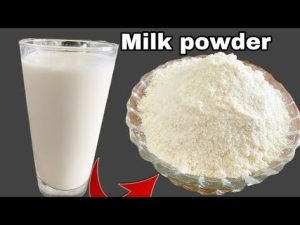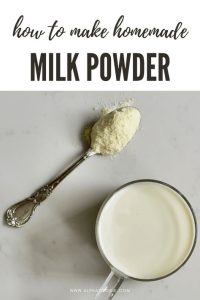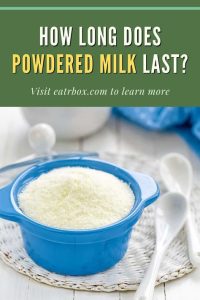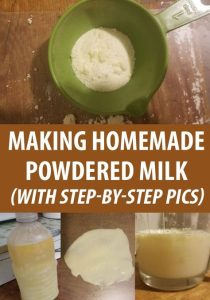Milk powder is a shelf-stable dairy product by removing the water from liquid milk. It offers a long shelf life and portability, making it a popular choice for many households. However, due to the complex processes involved, we don’t recommend making milk powder at home.
This article explores the benefits and uses of milk powder, along with the science behind its production. We will also discuss safe alternatives for those seeking shelf-stable dairy options.
The Benefits of Milk Powder
It offers several advantages over fresh milk:
Long Shelf Life:
It can last for months or even years without refrigeration, unlike fresh milk which spoils quickly.
Portability:
It is lightweight and compact, making it ideal for camping, backpacking, or emergency preparedness kits.
Versatility:
It can be reconstituted with water to create a beverage similar to fresh milk. We can also use it in baking, cooking, and making yogurt.

The Science Behind Milk Powder Production
Manufacturing powder involves several steps that require specialized equipment and controlled environments. Here’s a simplified overview:
-
Standardization: Raw milk is tested and adjusted to achieve a consistent fat content.
-
Pasteurization: The milk is heated to eliminate harmful bacteria.
-
Evaporation: Water is removed from the milk using various methods like vacuum evaporation or spray drying.
-
Drying: The concentrated milk is further dried to a powder form.
-
Packaging: You can pack the powder in airtight containers to prevent moisture absorption and spoilage.
Safe Alternatives to Making Milk Powder at Home
While powder offers convenience, it’s not possible to safely replicate the manufacturing process at home. Here are some safe alternatives:
-
UHT Milk: Ultra-high-temperature (UHT) milk is commercially sterilized milk with an extended shelf life without refrigeration.
-
Evaporated Milk: Evaporated milk is milk with some of the water removed, resulting in a thicker consistency. It requires refrigeration after opening but has a longer shelf life than fresh milk.
-
Powdered Non-Dairy Milk: For those with lactose intolerance or vegan dietary choices, powdered non-dairy milk alternatives like soy milk powder or almond milk powder are available.

Enjoying the Convenience of Milk Powder
It offers a convenient and versatile dairy option. While not feasible to produce at home safely, commercially produced milk powder goes through rigorous processes to ensure quality and safety. Consider the variety of store-bought options or explore the alternatives mentioned above to find the best fit for your needs.
The Risks of Homemade Milk Powder
While the concept of making your own powder may seem appealing, it’s important to understand the risks involved. Here’s why homemade powder is not good:
-
Improper Equipment: The processes used in commercial powder production involve specialized machinery and controlled environments to ensure hygiene and safety. Replicating these conditions at home is difficult, if not impossible.
-
Risk of Bacterial Growth: Milk is a perishable food that can harbor harmful bacteria. Without proper pasteurization and drying techniques, homemade powder can increase the risk of foodborne illness.
-
Spoilage: Homemade powder may not have the same extended shelf life as commercially produced options. This can lead to spoilage and potential health risks.
Safe Alternatives for Shelf-Stable Milk Options
Here are some safe and readily available alternatives to homemade milk powder:
-
Store-bought Milk Powder: Numerous brands offer commercially produced milk powder that is safe to consume. Look for reputable brands that follow strict food safety regulations.
-
UHT Milk: Ultra-high-temperature (UHT) milk is a commercially sterilized milk option with a longer shelf life than fresh milk and doesn’t require refrigeration unopened.
-
Evaporated Milk: Evaporated milk is a shelf-stable option with some of the water removed, resulting in a thicker consistency. It requires refrigeration after opening but lasts longer than fresh milk.
-
Powdered Non-Dairy Milk: Powdered plant-based milk alternatives like soy milk powder or almond milk offer lactose-free and vegan options with extended shelf life.
By choosing commercially produced options or exploring these shelf-stable alternatives, you can enjoy the convenience of milk without the risks associated with homemade powder.
Focus on Safe and Available Options
While homemade powder carries significant risks, there are several safe and convenient alternatives available:
-
Explore Store-bought Options: A wide variety of commercially produced powder exists, ensuring safety and quality. Look for reputable brands with labels indicating proper pasteurization and drying processes.
-
UHT Milk for Convenience: Ultra-high-temperature (UHT) milk offers a shelf-stable option without refrigeration unopened. It undergoes a sterilization process for extended shelf life.
-
Evaporated Milk for Baking: Evaporated milk is a shelf-stable option with some water removed, perfect for baking and cooking. Remember, it requires refrigeration after opening.
-
Powdered Plant-Based Milk Alternatives: For those seeking lactose-free or vegan options, powdered plant-based milk alternatives like soy or almond powder provide a shelf-stable and convenient choice.
These alternatives offer the benefits of long shelf life and portability, similar to homemade powder, but prioritize safety through established commercial processes.

Safety First: Enjoying Milk Powder Without DIY Risks
As discussed, attempting to make milk powder at home involves significant risks. However, there are several safe and convenient ways to enjoy the benefits of powder:
-
Discover Store-Bought Varieties: Numerous brands offer commercially produced powder that prioritizes safety and hygiene. Look for reputable brands with labels indicating proper pasteurization and drying techniques.
-
UHT Milk: Shelf-Stable Convenience: Ultra-high-temperature (UHT) milk undergoes a sterilization process for extended shelf life without refrigeration unopened. Explore this option for its convenience.
-
Evaporated Milk for Baking Needs: While not exactly powder, evaporated milk is a shelf-stable option perfect for baking and cooking due to its thicker consistency. Remember to refrigerate after opening.
-
Powdered Plant-Based Milk Alternatives: For those seeking lactose-free or vegan options, powdered plant-based milk alternatives like soy or almond powder provide a shelf-stable and convenient choice.

These store-bought options or shelf-stable alternatives offer the same benefits as homemade powder, but prioritize safety through established commercial processes. Focus on exploring these options to enjoy the convenience of powder without the risks involved in DIY methods. umerous brands offer commercially produced powder in various types. Look for options like whole powder, skim powder, or even instant powder for quick beverage preparation. Ultra-high-temperature (UHT) milk undergoes a special heating process for extended shelf life without refrigeration. Explore this option for its convenience in both storage and use.

